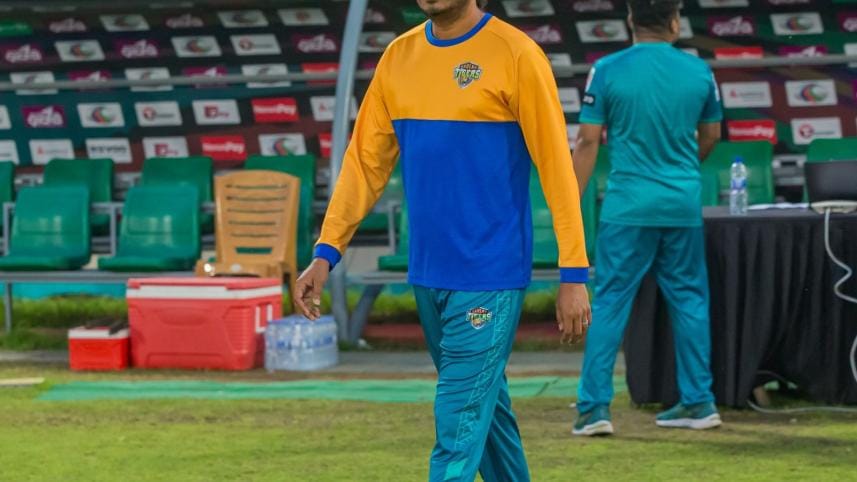Hurting Talha ‘living the dream’ of forging fast bowlers

A dramatic last-ball boundary shattered Khulna Tigers' Bangladesh Premier League (BPL) campaign to a heartbreaking end on Thursday. Yet, head coach Talha Jubair deserves credit for guiding a team lacking star power to the penultimate hurdle, marking another chapter in the former national pacer's coaching journey. The 39-year-old spoke to The Daily Star's Samsul Arefin Khan about why he prefers being a bowling coach, the evolution of Bangladesh's pace bowling and more. Here are the excerpts from the interview:
The Daily Star (DS): It must be difficult to get over such a heartbreaking defeat to Chittagong Kings.
Talha Jubair (TJ): What I felt was that we were kind of relaxed after Chittagong lost a couple of quick wickets. Jason Holder then conceded a six and a four in the 18th over. If we had 30 runs to defend in the last over, we could have bowled the 19th over with Musfik [Hasan] and kept the last over for Hasan [Mahmud]. But when it required only 21 runs, [Mehedi] Miraz didn't take that risk. However, I always prefer Jason Holder to bowl the last over. I also sent the information to the ground, but the captain will always take the final call. Miraz was on the ground, he understood the situation better, and he gave the ball to Musfik. I'm not blaming anyone. The way our players played in the tournament, I'm so proud of them.
DS: At one stage, it looked like you guys wouldn't be able to make the playoffs. Then you won back-to-back matches to reach the knockouts and also beat Rangpur Riders in the Eliminator. What was the team's mindset during that phase?
TJ: Rangpur were under pressure as they hadn't been doing well for a couple of matches. Their in-form foreign players had also left the side by that time. We were confident that if we could put up a good total, we could beat Rangpur. Actually, we never thought of losing the game against Rangpur. The way we batted, especially [Mohammad] Naim, was absolutely awesome. After beating Rangpur, we actually gained confidence.
In the Eliminator, if I told you that we planned to beat Rangpur in a similar way, I would be lying. I was only thinking about Iftikhar and Sunil Narine [who didn't come]. I wasn't thinking about [Andre] Russell or Tim David. It's not easy to play a good innings instantly on the Mirpur wicket. I was afraid of Narine because he had four overs. When I heard that Sunil didn't come and Iftikhar wasn't playing, I became so confident that we could beat them. But the way we beat them, I couldn't even have imagined.
DS: Can you describe your coaching journey so far?
TJ: When I started coaching, my main motive was to become a pace-bowling coach. I have huge disappointment regarding my playing career. I couldn't lengthen my career as it should have gone. That disappointment will remain until my death. So my main purpose right now is to help produce more pace bowlers for Bangladesh.
My wife has made the biggest contribution to my decision in taking up coaching as a profession. She forced me to become a coach. She also sacrificed a lot. When I started coaching, I mainly worked with the pacers, whichever team I worked for. Then I got a job with the board, and I also oversee the pacers here. I never thought of becoming a head coach.
Khaled Mahmud Sujon bhai gave me a big break by allowing me to work with Dynamites when I had just come into coaching. We became champions that season, and Sujon bhai and Obaid [R Nizam] bhai were really happy with my work. I also worked for Abahani in the same year as a bowling coach. Abahani also became champions that season. Then Sujon bhai made me the head coach of Shinepukur for the next season. I also worked as the head coach of Dhaka Metro. Then I got U-19 responsibilities. I feel so proud that I'm living my dream of working with the pacers.
If anyone proposes that I become a head coach and another offers me the role of bowling coach, I may choose the second option. I prefer being a bowling coach because I own that place.
DS: Has your disappointment from your playing days subdued to some extent now that you're in coaching?
TJ: To be honest, it has reduced quite a bit. But when players like Nahid [Rana], Ripon [Mondol], Ashikur [Zaman], Musfik, Shoriful [Islam], Khaled [Ahmed], and even Taskin [Ahmed] play really well, I feel so proud. When I was playing for Dhaka Metro, I got to know Taskin. I found him so vibrant and aggressive, just like my younger days, and I saw a similar mentality in him. When he was off-form, we discussed so many things regarding his bowling.
In this year's U-19 Asia Cup as well, our pacers bowled exceptionally well. The more pace bowlers I produce, the more my disappointment will reduce gradually.
DS: What are the differences you see in current pacers compared to your generation or before?
TJ: We didn't get the chance to play so many matches. Apart from that, the number of pressure matches has increased. Now there are many tournaments happening across the world. Previously, there was no option to follow matches, but now, with YouTube and other channels, we can track these matches.
I think currently, players face pressure situations more than at any other time, and that improves their game sense. In modern-day cricket, bowlers have to learn because it's now a game of fours and sixes. Without learning, they can't do anything. That's why they think about the game so much; because they know that without work ethic and hard work they can't reach the next level.




 For all latest news, follow The Daily Star's Google News channel.
For all latest news, follow The Daily Star's Google News channel.
Comments